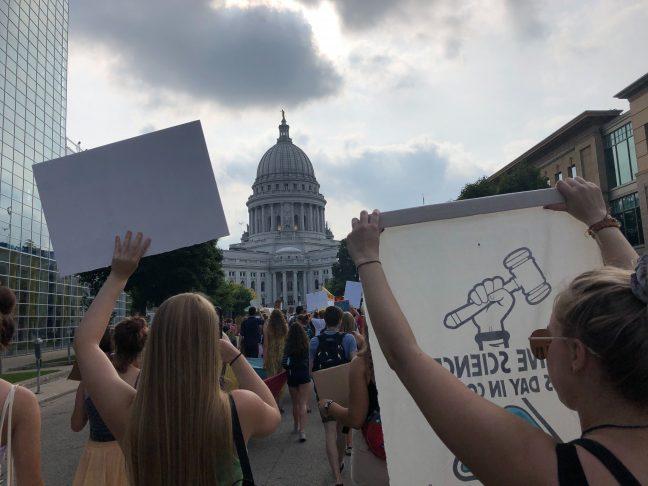Last Friday, Sept. 20, Max Prestigiacomo, a freshman at the University of Wisconsin, led his second Madison-based climate change strike.
According to The Cap Times, last March, Prestigiacomo led another strike for climate change. More than 1,000 students showed up and filled the streets of Madison from East High School all the way to the Capitol.
“This movement is being led by young people who are fed up with the status quo, … ” Prestigiacomo said. “Because we keep on pushing, it just shows that this movement needs to be led by young people who haven’t been conformed by society.”
Last March, the strike called on Gov. Tony Evers, who had announced his goal of Wisconsin having carbon-free electricity by 2050. Prestigiacomo, as well as other protesters, agreed that by 2050, it would be too late, and that they should shoot for 2030 instead.
Prestigiacomo said the Youth Climate Action Team of Wisconsin had several failed attempts to get into contact with Evers to discuss their ideas. Until finally, after the climate strike in March and much media attention, they set up a meeting.
“Because of those articles we do have a meeting now,” Preestigiacomo said. “Governor Evers is attempting to support climate change and support us, but we don’t think that’s enough … I’m just confident that we’ll really push his office to realize that it’s bigger than just a few teenagers pushing this. The whole community stands behind us.”
Prestigiacomo mentioned that though the focus of this strike is the same as the last one in getting Evers to declare a climate emergency, the big difference between the two is that Friday’s strike was meant to include everyone from the community, not just students.
He argued that support from the community will only make the impact more powerful.
“We’re just hoping everyone treats this as a crisis,” Prestigiacomo said. “We don’t care that you’re hopeful for the future. This is a crisis. We are super frustrated right not. You have to show it with action. This is a time when everyone needs to be angry and everyone needs to be on the streets.”
According to The Cap Times, students in the Madison school district were allowed to be excused from school on Friday with a call from a parent or guardian, which aligns with policy the district has followed for similar events.
To kick off the event Friday, protesters rallied at MG&E to have what Prestigiacomo called a type of “block party” where food and activities were present. At 3 p.m., protesters began their march to the Capitol, which Prestigiacomo called the focal point of the event.
Organizers also set up a livestream of a speech made by Swedish high school climate activist Greta Thunberg.
Between college students leading climate change protests around the country and Thunberg, a 16-year-old high school student from Sweden, traveling the world to demand environmental justice, Prestigiacomo argues that it’s in this generation’s hands to put an end to global warming.
Brooke Schooley, a biology major at UW and an environmental activist, agrees this generation is doing a great job of drawing attention to the issue. But she also thinks that it’s not only our responsibility — it’s everyone’s.
“I think that it shouldn’t be in the hands of a single generation,” Schooley said. “We’ll all be impacted by climate change and because of that we should all do our share in working to address these issues sooner rather than later.”
Prestigiacomo said there are lots of simple changes people can make to their everyday lives in order to live more sustainably. He advocated for things that will lower carbon footprints such as recycling, going vegetarian and lessening plastic usage.
On top of this, he argued one of the most important things an individual can do is exercise their right to vote.
“Voting is supposedly the one right we are all guaranteed, so we need to be voting out the people who aren’t doing anything,” Prestigiacomo said. “We need to be talking about the companies in Madison who are contributing to the climate crisis. We need to be recognizing the power players in the system who have the power to make a change but aren’t doing so.”


